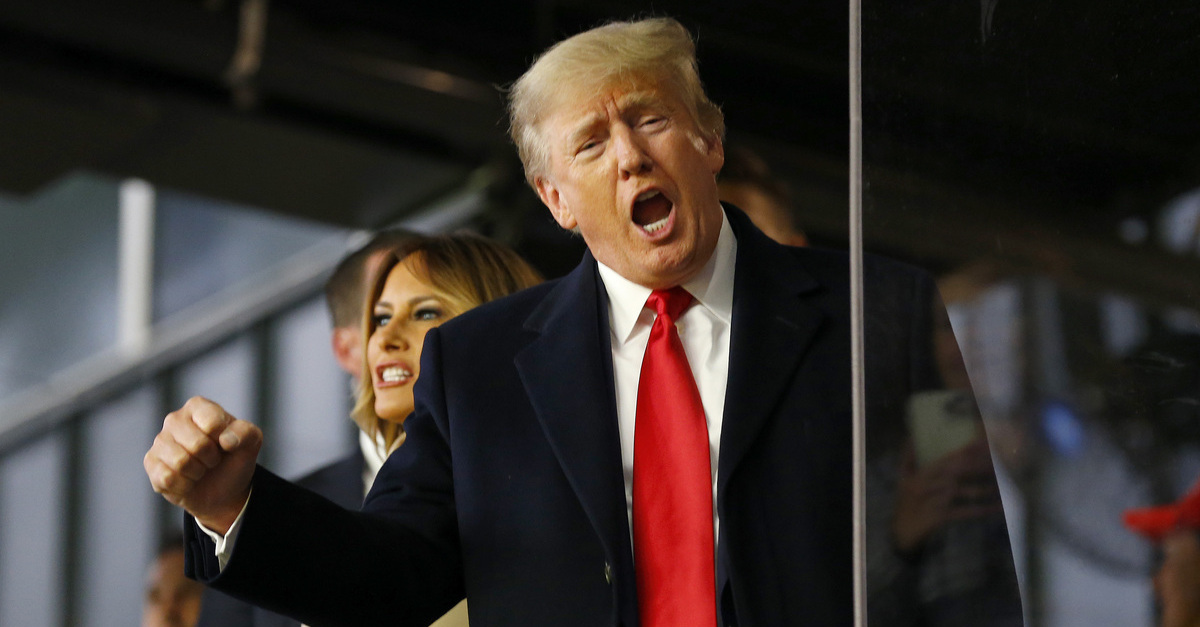
Former President Donald Trump can cap the $10,000-per-day contempt order accruing against him at a $110,000 fine payable to the office of New York Attorney General Letitia James — if he complies with certain conditions, a Manhattan judge ruled on Wednesday.
On April 25, Manhattan Supreme Court Justice Arthur Engoron found Trump in contempt of court for failing to comply with subpoenas related to the attorney general’s probe into whether he inappropriately inflated or deflated assets for certain tax benefits.
“Mr. Trump, I know you take your business seriously, and I take mine seriously,” Engoron said last month before banging a gavel.
The fine became active on the date of the written opinion, and Trump lost a previous attempt to purge that order with an affidavit insisting that he had no more information to turn over the attorney general.
On Wednesday, Engoron gave the former president an off-ramp if he satisfies multiple conditions by May 20.
Trump must file so-called “Jackson affidavits,” which must contain more detail about the searches and policies related to the destruction and retention of files. HaystackID, the Republican-party affiliated eDiscovery firm that he retained, must have completed its review and submit its report on subpoena compliance.
The former president also must have paid a $110,000 fine to the Office of the Attorney General, representing the total from the date of the judge’s written order up to May 6.
“Failure to satisfy any of the above conditions shall result in the contempt order being restored and the fine reinstated retroactively to Saturday, May 7, 2022,” Engoron’s written order states.
Attorney General James applauded the outcome as a result of her office’s persistent and tenacious pursuit.
“Reaffirming a ruling holding Donald J. Trump in contempt, a judge has ordered Mr. Trump to pay my office for his refusal to comply with our subpoenas,” James wrote in a statement. “For years, Mr. Trump and the Trump Organization have tried to thwart our lawful investigation, but today’s decision makes clear that no one can evade accountability. We will continue to enforce the law and seek answers as part of this investigation.”
Trump’s attorney Alina Habba did not immediately respond to a Law&Crime email requesting comment.
In the past, Habba pulled few punches in her criticism of Justice Engoron’s ruling. She initially described the contempt order as “crazy” and accused him of theatrics like the “dramatic pounding of the gavel” that, in her view, reduced the proceedings into “public spectacle.”
Trump, her client, lashed out at Attorney General James and Manhattan District Attorney Alvin Bragg as “racist.” Both James and Bragg are Black, and at least officially, both have lodged active investigations against Trump and his business, though the criminal investigation by Bragg appears to have stagnated.
The parallel investigations trace their roots to testimony by Trump’s ex-fixer Michael Cohen in 2019, accusing his former boss of cooking the books for tax benefits. The criminal investigation began under Bragg’s predecessor Cyrus Vance (D), who had hired former racketeering prosecutor Mark Pomerantz to help lead the investigation along with his general counsel, Carey Dunne. Both Pomerantz and Dunne tendered their indignant resignations in face of Bragg’s reported reluctance to prosecute Trump.
Unlike the DA’s probe, James’s investigation remains civil in nature, and she prevailed earlier this year in her bid to depose Trump and two his adult children Ivanka Trump and Donald Trump Jr. The attorney general previously deposed Eric Trump, who answered more than 500 questions by asserting his Fifth Amendment right against self-incrimination.
Since Eric Trump’s deposition, James revealed that she had been assisting in the Manhattan DA’s criminal probe, and the other members of the Trump family argue that puts them in a Catch 22. If they invoke their Fifth Amendment rights to (in essence) remain silent, those answers cannot be used against them in criminal proceedings, but they can be used to create an adverse inference in civil court.
That issue lies at the heart of the appeal of an earlier ruling by Justice Engoron, which remains pending before the appellate division.
Update—May 11, 2022 at 3:03 p.m. Eastern Time: This story has been updated to include the judge’s written order.
Read the ruling, below:
(Michael Zarrilli/Getty Images)